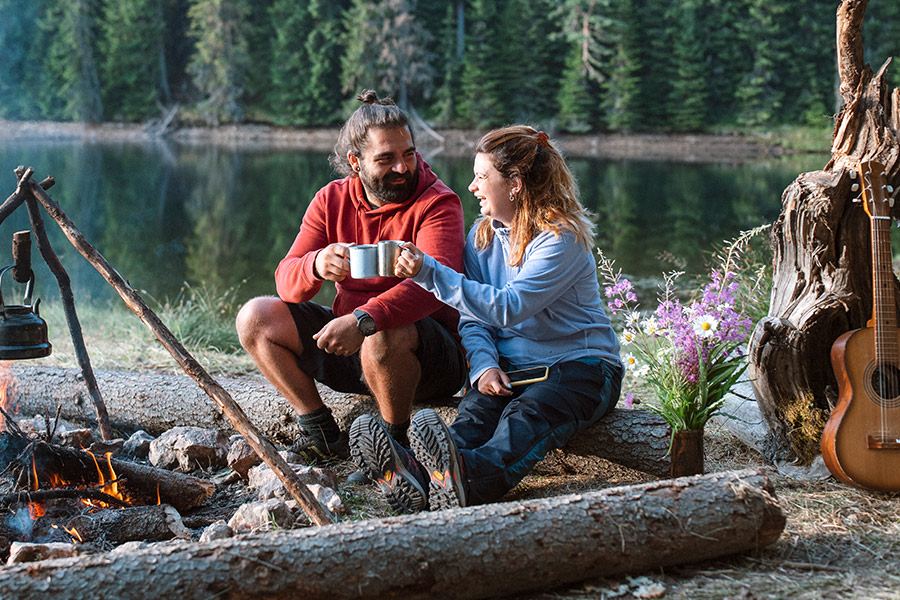Money Saving 301
Save Money by Camping

When money is tight, it can be hard to justify a vacation. But there are more options now than ever for getting away. If you’re looking to travel on a budget, you may want to consider camping.
According to Forbes.com, millions of more Americans are camping now than ever before. The Dyrt reports 20% of Americans went camping last year alone.
Aside from being less expensive than staying in hotels, camping offers a chance to disconnect from our devices, enjoy peace and quiet, and experience the beauty and awe of nature. Camping can save you money on food and drinks, flights, baggage fees, activities, souvenirs and more versus other travel. You can also camp almost anywhere, allowing you to see places off the beaten path while avoiding crowds.
Let’s look at how to save money while camping including where to camp, the gear you’ll need, and camping meals.
Where to Go Camping
An amazing variety of low-cost campsites are available to fit your budget. From parks to private land, you can stay almost anywhere in the country. Rates are often cheaper on off-peak days during the week as well as at the beginning and end of the season (also known as the “shoulder season”).
- City, County and State Parks. Many of these parks offer camp sites for rental. Some even offer cabins and similar accommodations, which can be a good option for first-time campers who are testing the waters. You may be able to get away without even leaving your city, saving you gas and travel time too. Search “camping near me” or “campsites near me” for more information.
- National Parks. Campers overwhelmed the U.S. national park system during COVID, but things are slowly returning to normal. While they’re not the least expensive places to camp, the 2,000 parks and national wildlife refuges in the U.S. offer a great opportunity to see the country. Aim for one of the less-visited parks and you’ll be rewarded with fewer crowds. Consider volunteering to help restore trails and areas damaged during the COVID visitor surge.
- U.S. Forest Service (USFS) sites. There are more than 170 national forests and grasslands operated by the U.S. Forest Service. Visitors can camp for free here provided they follow Leave No Trace and other guidelines. Your regional USFS office can provide information on area regulations and special considerations like bear precautions. Visit recreation.gov for information about campsites across the country.
- Free campgrounds. Sites like freecampsites.net and Campendium are helpful resources to find a place to pitch a tent or park your RV for free.
- Private land/campgrounds. Apps and websites, such as Hipcamp.com, connect campers and landowners who offer campsites. This can be an excellent way to avoid the crowd. Many owners have cabins and glamping accommodations available, too.
For the most cost-effective options, be sure to plan ahead and arrive as early as you can. Campsites can fill up as the day goes on, though some sites do accept reservations. Regardless of where you’re going, making the arrangements ahead of time will help you make the most of your camping dollar.
Budget-Friendly Camping Gear
The equipment you’ll need depends on the type of camping you plan to do. You’ll need more equipment if you’re tent camping than if you have an RV, for example. There are lots of sites with tips for camping to advise you on what gear to take, so make the most of other campers’ experience.
There are many ways to save on whatever equipment you’ll need.
- Borrow. With so many people now camping, you may know someone with equipment you need. Ask if they are willing to lend the item for your trip. If it requires set up, see if they’ll show you how to use it. Keep a list of what you borrowed and who it’s from so you can return items. Return them promptly, clean and in good condition so friends will lend to you again.
- Rent. If you’re not a frequent camper, consider renting the items you need. Retailers like REI Co-op, Outdoors Geek and local small businesses offer rentals on many items.
- Get items used. For used camping items check out websites like Switchback Gear Exchange, Ebay, Facebook Marketplace, and local sporting goods retail stores like Play It Again Sports. There are lots of great options to get used equipment. Serious campers and backpackers often upgrade their equipment over time, leaving an opportunity for you to get great equipment at a great price. Even brands like Eddie Bauer and Patagonia are now offering their own resale sites.
- Consider outdoor store annual “garage sales.” According to FarmersAlmanac.com, sites like REI, Steep & Cheap, Gear Trade, Sierra, and more offer deep discounts and even lightly used or returned items during annual sales.
- Buy off-season. Like most items, camping gear is cheaper going into the off-season than when the season approaches. Watch for discounts in the late summer and fall.
- Outdoor outlet stores. Sierra (formerly Sierra Trading Post) now has physical stores full of outdoor and camping items at deeply discounted prices. OutdoorOutlet.com and others are available online.
- Use what you have. For example, if you’re renting a camper take silverware from home. Use blankets instead of sleeping bags. If you’re just trying out camping or are looking to save, there there’s no need to buy a lot of new equipment.
Even if you plan to continue camping, there are plenty of ways to save on the equipment you want. And there’s nothing wrong with building up your gear gradually. Don’t be afraid to get started making memories without the fancy equipment. If you need help with budgeting, we’ve got your back!
Camping Meals
While serious backpackers may order lightweight, ready-to-eat meals, they’re very expensive and most campers don’t need them. There are plenty of other options for budget-friendly campground meals.
Preparing food in advance is a great way to avoid cooking during a camping trip. You can cook complete meals and add pre-packed sides from your local grocery. You can also make parts of the meal ahead of time, like hot dogs or grilled chicken, then make a side over the campfire.
Cooking over a fire isn’t as challenging as it may seem. A quick Google search will offer dozens of delicious campfire meals. Often all you need is aluminum foil and a few groceries and you’ll have a new outdoor skill under your belt.
Camping can save you a lot of money over a traditional vacation while creating a unique experience. With a small investment, you can get started making memories that will last a lifetime.
Editorial Policy: The information contained in Check `n Go’s Finance Academy Learning Center is for educational purposes only and is not legal advice. You should consult your own attorney or seek specific advice from a legal professional regarding any legal issues. Check `n Go does not act as a credit counseling, repair service, or debt consolidation service in providing this content. Please understand that Check `n Go policies change over time. Blog posts reflect Check `n Go policy at the time of writing. While maintained for your information, archived posts may not reflect current Check `n Go policy.
The information contained in our blog posts are the author’s own opinions, not those of Check `n Go or any other company. Any pros and cons are developed by our editorial team based on independent research. Some of the products, services, and offers on this page may not be available from Check `n Go. In Texas only: Check `n Go does not act as a credit services organization in providing this content.



